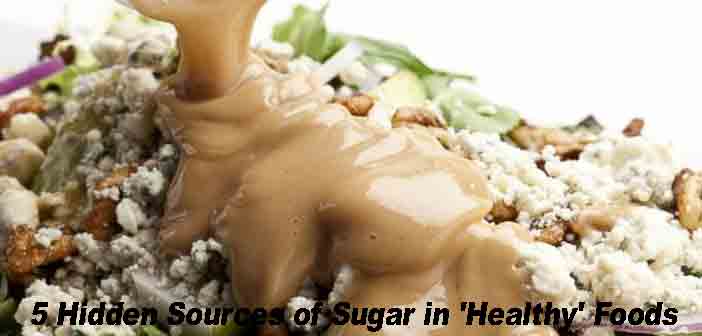There’s no way to sugarcoat it: We’re consuming too much sugar. And just in March, the World Health Organization drafted new guidelines, reducing the recommended sugar intake to a tiny 5 percent of daily calories — half of what the organization previously recommended. For someone on a 2,000-calorie diet, new guidelines mean a sugar limit of about 100 calories, or six sugar packets.
That should be doable, but in the American food jungle, nothing is as it appears. When I researched my book Eat It to Beat It!, I found sugar in thousands of places where it doesn’t belong, from bread to salad dressing, dressed up in disguises like corn syrup, maltodextrin and sucrose. Here are five of the most shocking hidden sources of sugar in otherwise “healthy” meals. Keep these on your radar, and you too can eat it to beat it!
1. Salad Dressing
Salad dressings, particularly light and fat-free versions, are loaded with salt and sugar to compensate for the flavor lost by cutting out the fat. Some brands pack in as much as 9 grams of sugar per serving! Beat it! Be wary of ketchup-based dressings (French, Russian, Thousand Island) and fruity vinaigrettes (raspberry, pomegranate), as they typically include added sugar. Always ask for dressing on the side, and choose varieties with less than 2 grams of sugar per 2-tablespoon serving.
2. “Healthy” Oat Cereal
It may not shock you that cereals with the words “froot” or “chocolatey” on the box contain added sugar; but somewhat less obvious are “healthy,” “whole-grain” cereals and granolas that can pack upwards of 15 grams of sugar in less than a cup! Beat it! Steer Clear of the Three C’s: “crunch,” crisps” and “clusters.” These words usually mean that there are clumps of crispy rice held together by sugar and fat. Tasty! But more candy-like than breakfast-like. Add some no-sugar crunch to your cereal or yogurt with 2 to 4 tablespoons of heart-healthy nuts.
3. Flavored Yogurt
All yogurts contain some sugar in the form of lactose (milk sugar); it’s the added sugar typical of fruit yogurts that you need to watch out for. Beat it! Make sure all sugars are accounted for in the ingredients list and none come from “sugar” or “high-fructose corn syrup.” And try the Greek life! In roughly the same amount of calories as regular yogurt, Greek yogurt has double the protein and far less sugar.
4. Dried Fruit
Dried fruit can be a healthy, fiber-filled snack or salad topping, but in many cases, it might as well be candy. Just a quarter cup of dried cranberries — a single handful — can have as much as 29 grams of sugar! And it’s not all coming from the naturally sweet fruit. A full cup of fresh cranberries has a mere 4 grams of natural sugar. Beat it! Check ingredient lists on dried fruits for sugar and its aliases, or opt for fresh fruit instead.
5. Sauces and Marinades for the Grill
Adding sauces — barbecue, teriyaki, jerk — to grilled meats can add mega flavor with minimal fat, but in some products, sugars can account for 80 percent of the calories. A skimpy two tablespoon serving of barbecue sauce can have 12 grams of sugar! And has just two? Beat it! Ask for “half sauce” when dining out. At home, consider making your own and cutting the sugar.

